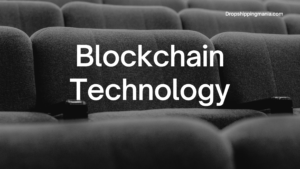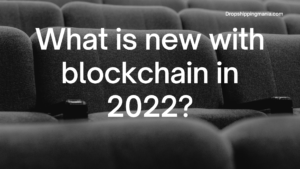this
Blockchain Technology
Blockchain technology is one of the most innovative and game-changing technologies to come about in recent years. With its potential to revolutionize everything from financial transactions to how we store data, it’s no wonder that so many industries are taking notice. In this blog post, we will explore what blockchain technology is and how it works. We will also discuss its potential implications for the future of business, specifically in the areas of security and transparency.

Is blockchain the future 2022?
While the future of this is still unclear, there are some experts that believe that by 2022, the technology will widely adopted and integrated into our everyday lives. Blockchain has the potential to revolutionize how we interact with the digital world, and its applications are only limit by our imagination.
As we become more reliant on digital systems and data, it is important that we have a secure and reliable way to store and manage this information. Blockchain provides a decentralized and tamper-proof way to do this, which could prove to be invaluable in the years to come. While there are still some challenges that need to address before this can fully realize, its potential is undeniable.

What is new with blockchain in 2022?
In 2022, blockchain technology will continue to evolve and become more widely adopted. Here are some of the most exciting developments we can expect to see:
1. More businesses will begin using blockchain to streamline operations and reduce costs.
2. More countries will start adopting blockchain-based systems for various applications, including payments, land registries, and identity management.
3. We will see an increase in the use of private or permissioned blockchains as enterprises seek more control over their data.
4. The scalability of blockchain technology will continue to improve, with new solutions being developed to help handle large amounts of data and transactions.
5. New types of applications for blockchain will discover, and we can expect to see even more innovation in this space in the years to come.

What is the next trend in blockchain?
There is no answer to this question, as the next trend in this will likely vary depending on the specific industry or use case. However, some experts believe that the next big trend in blockchain will the development of platforms that can use by large organizations. These aims would need to offer robust security and scalability features in order to meet the needs of enterprise users. Additionally, there may also be a move towards using this for more than just financial transactions. For example, supply chain management and data management are two areas where this could potentially have a major impact.

Blockchain Technology applications
The Blockchain technology has a huge potential to change the way we interact with the internet and digital devices. Its applications are numerous, including:
-A secure, decentralized ledger for recording transactions
-A platform for developing decentralized applications
-A tool for combating fraud and counterfeit items
-A way to streamline supply chain management
-A means of encrypting data and ensuring privacy
The blockchain is still in its early stages, with many more potential applications yet to be discovered. Exciting times lie ahead for this transformative technology!
Blockchain in eCommerce
The use of this in eCommerce is still in its early stages, but there are a number of potential applications that could revolutionize the way we buy and sell online. For example, this could be used to create a decentralized marketplace where buyers and sellers can trade directly without the need for a third-party platform.
Blockchain could also use to streamline the process of verifying identity and authenticating transactions. This would make it much more difficult for fraudsters to operate on eCommerce platforms, and could ultimately make online shopping safer and more secure for everyone involved.
There are many other potential uses for blockchain in eCommerce. And we are only just beginning to scratch the surface of what this technology can do. As more businesses begin to explore its potential, we are likely to see even more innovative and transformative applications of blockchain in the eCommerce space.
Blockchain in Real Estate
The potential of this technology is beginning to realize by a number of industries, and real estate is no different. While the use cases for this in real estate are still explored, there are a number of potential benefits that could realize by adopting this technology.
One of the most promising applications of this in real estate is the use of smart contracts. Smart contracts can automate a number of processes and tasks associated with buying, selling, or leasing property. This could potentially save a lot of time and money for all parties involved in a real estate transaction.
Another area where blockchain could have a major impact is in title and deed management. The decentralized nature of this could help to streamline the process of transferring ownership of property. This could make it easier and faster to buy or sell property, as well as reducing the chances for errors or fraud.
Finally, this technology could also use to create a more efficient and secure system for tracking energy usage in buildings. This would allow landlords and tenants to better monitor energy consumption and identify areas where improvements can made. In the long run, this could lead to reduced energy costs for everyone involved.
These are just a few examples of how this technology could revolutionize the real estate industry. As more use cases are explored and developed, it’s likely that even more benefits will found.

Blockchain in FinTech
The comprehensive guide
Blockchain technology is being adopted by financial institutions and FinTech startups globally as it offers a distributed ledger system that is secure, transparent and tamper-proof. Blockchain can use to develop applications for various financial services including payments, asset management, trading and compliance.
In the payments space, this can use to process cross-border payments quickly and securely. It can also use to settle transactions between multiple parties without the need for a central authority. In addition, this can help reduce fraudulent activities such as chargebacks and money laundering.
In asset management, this can use to smooth the entire asset lifecycle from issuance to trading to settlement. It can also help improve transparency and security in the management of digital assets. In trading, this can use to create a decentralized exchange where users can trade directly with each other without the need for a third party. And in compliance, this can help organizations automate KYC (know your customer) and AML (anti-money laundering) processes.
Blockchain in Healthcare
The potential of this technology to change the primary care sector is vast. By providing a secure, decentralized platform for storing and sharing data. Blockchain has the potential to streamline healthcare data management, reduce costs, and improve patient care.
In recent years, there have been a number of pilots and proof-of-concepts (POCs) testing the practicability
While the jury is still out on whether or not this will live up to its hype in health protection, there are signs that the technology is starting to gain traction. A number of major health protection organizations have invested in this startups. And new consortiums are formed to explore how this can use to solve some of the most pressing challenges facing the health protection sector.

How is blockchain used in finance?
There are a number of different ways that this technology can use in finance. One way is through the use of smart contracts. Smart contracts are computer programs that can automatically executereport
based on predetermined conditions. This can allow for more efficient and secure financial deal.
Another way that this can use in finance is by providing a platform for Initial Coin Offerings (ICOs). ICOs are a new way of raising capital for creation. Which allows them to issue digital tokens in exchange for investment. This can provide an alternative to traditional methods such as venture capital or bank loans.
Blockchain technology can also use to create separated exchanges. These exchanges are not under the control of any central authority. Which could make them more protected to manipulation or fraud. Decentralized exchanges could also potentially offer lower fees and faster transaction times than traditional exchanges.
Overall, this technology has the potential to revolutionize the financial sector by providing a more secure, efficient .
Blockchain Technology in education
The use of this technology in education can a great way to ensure the security and honesty of educational data. With this , each piece of data is firmly encrypt and store in a agent ledger. This makes it difficult for anyone to tamper with the data, or even delete it.
Blockchain can also use to verify the identity of students and professors. By using digital signatures and cryptographic hashing, this can provide a secure way to verify naming . This can be useful for stop fraud, or even just making sure that everyone is who they say they are.
Ultimately, this technology has the potential to define education. It can make data more secure, placing more testable , and processes more well organized. If you’re interest in learning more about how this can used in education, then sure to check out this blog post!

For more informative article visit this link:


